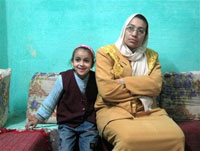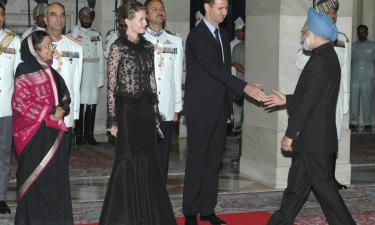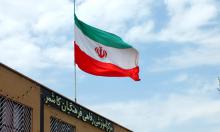Number of circumcised young girls declines steadily in Egypt
In this small Nile River farming village, Maha Mohammed has started to doubt whether she should circumcise her two daughters.

A year ago, she had few qualms about female genital mutilation, the practice of cutting a girl's clitoris and sometimes other genitalia. She herself was cut two decades ago, and she fears her daughters will not find husbands otherwise.
But Mohammed also has heard that circumcision can be medically risky and emotionally painful. And a strong-willed neighbor, another woman, has been dropping by her house regularly to persuade her to say no.
"I hear that girls suffer not just physically but psychologically," the 31-year-old Mohammed said. "But I am afraid. I don't want my daughters to have uncontrollable demands for sex."
Such doubts are significant. With vigorous grass-roots campaigns and the passage of tough laws against circumcision, Egypt seems to be making a dent in this deeply ingrained practice, thousands of years old. The number of young girls circumcised is now steadily declining in a country where an estimated 96 percent of married Egyptian women have had their genitals cut.
The most recent comprehensive study predicts about 63 percent of Egyptian girls 9 years old and under will be circumcised over the next decade. The numbers are lower in urban areas like Cairo - about 40 percent - but higher for rural areas in the south - about 78 percent, the government's 2005 demographic and health survey predicts.
The lower circumcision rate in urban areas is attributed to higher income and education levels and greater access to information. But in the villages along the Nile, where the rate is highest, a grass-roots effort is under way to bring information straight to people's homes.
The door-to-door campaign to end female genital mutilation is slow and time-consuming. It publicly plays down any outside help or connections to Western aid groups.
Instead, local activists focus on convincing Egyptians, one woman, one family and one village at a time. Often they reach out to women who have turned against the practice on their own, appealing to them to approach neighbors whose daughters are between ages 8 and 11.
Fatma Mohammed Ali is one.
The 35-year-old woman suffered intense complications after being circumcised at age 13, including severe pain during childbirth. Now she regularly visits her neighbor - Mohammed - gently discouraging her from the practice and using her own family as an example.
Neither of Ali's daughters was circumcised. Both are physically "normal" and one attends university - a high achievement for a woman from this village, Ali says.
"I don't care what everyone thinks. I was really harmed, and I didn't want this for my daughters," said Ali, a proud woman who often sits with her arms crossed against her chest. "When I talk about my experience, many become convinced. They also see how my daughters are good and religious."
It's difficult to encourage village women to go public with their views on the subject, said Nevine Saad Fouad, the project manager for child protection with a group called the Better Life Association for Comprehensive Development in the nearby city of Minya.
But when village women do go public, the results are astonishing.
Of some 3,000 families targeted over the past few years in several nearby villages, more than half say they have abandoned the practice, nearly 800 are undecided and fewer than 500 say they will continue to circumcise their daughters.
The key is convincing villages that stopping circumcision is an Egyptian idea - not one imported by international aid groups or Western governments, Fouad said. The group also promotes homegrown activities such as community plays, discussions with local doctors and religious debates.
Along with local groups taking action, Egypt's government has also been discouraging the practice in recent years. The National Council for Childhood and Motherhood has developed programs to help villages declare themselves against the cutting and sponsored an influential campaign of TV commercials and billboards featuring a young Egyptian girl.
Last year, the Ministry of Health prohibited licensed medical professionals from performing the procedure, and Egypt's parliament voted in June to ban it as part of a law protecting children. But activists stress that laws alone aren't enough.
"There is a wave of change right now," said Mona Amin of the childhood and motherhood council. "But we must keep this momentum, this intensity."
The pressure to uphold the tradition in this conservative, socially close-knit nation of 80 million people remains strong.
Many women fear potential husbands will reject daughters as impure or immoral. Medical rumors - including that circumcision is the only way to control a girl's sexual desires - are rampant. Others believe that abandoning the practice is caving to Western pressures to change their society.
Female genital mutilation is practiced in Africa and the Middle East by Muslims as well as Christians
In Egypt, leaders of both religions have spoken against it, including Coptic Christian Pope Shenouda III and Egypt's Grand Mufti Ali Gomaa, who issued a fatwa against it in 2007. But others, especially some local Muslim leaders, continue to give their blessing.
Egyptians also receive mixed messages from midwives and some doctors, Fouad said. Some doctors, midwives and even barbers make home visits, giving circumcision sales pitches - just to make money off the $10 for an operation, Fouad believes.
For now, for every mother who agrees not to circumcise her daughters, many others still go ahead, activists say - women like Samia Ali Taha, who lives in the same village as Ali and Mohammed.
Taha is convinced she must circumcise her daughter a year from now, in the summer after the girl finishes sixth grade. She feels that way despite visits from another woman neighbor who has told her that the medical rumors - including that a woman's clitoris will grow if not cut - are false.
"It's not an option. We can't have it otherwise," said Taha, 32. "It is something we have grown up with and our ancestors have done."
But at a nearby house, sitting with a 6-year-old daughter cradled in her lap, Mohammed says she is slowly being convinced the other way.
"Maybe I am 70 percent for not doing it. Part of my change of heart is talking with Fatma and others," Mohammed said.
The young mother hesitates. "But I am still confused," she says.
Subscribe to Pravda.Ru Telegram channel, Facebook, RSS!




